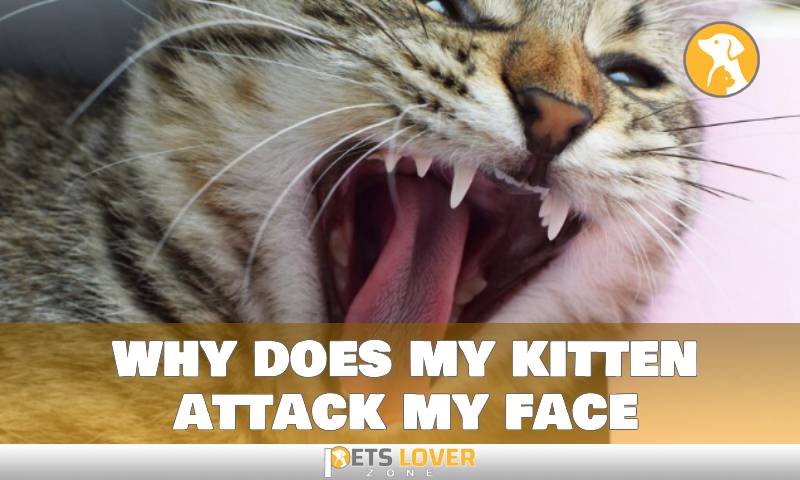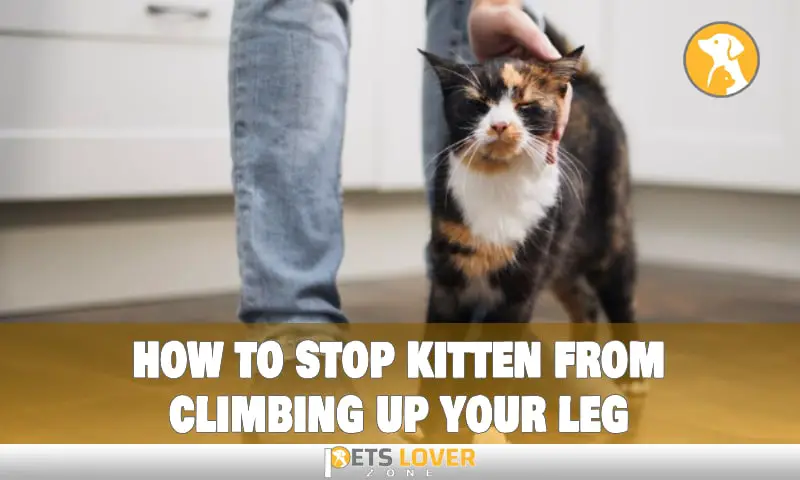Kittens attack your face because they are playfully exploring their surroundings and using their natural instincts. When young cats are still learning how to interact and socialize, they may engage in playfighting behavior, which involves pouncing and biting.
This behavior is normal and helps them develop their motor skills, build confidence, and establish boundaries. However, if the aggression becomes excessive or painful, it is important to redirect their behavior and provide appropriate outlets for their energy through interactive toys and play.
Remember, patience and consistent training can help redirect their playfulness toward more acceptable behavior.
What Drives Kittens To Attack Faces?
Kittens are adorable creatures that bring joy and warmth to our lives. However, they can sometimes exhibit behavior that leaves us bewildered, especially when they decide to launch an attack on our faces. While it may seem alarming, there are several reasons why kittens engage in this peculiar behavior.
Understanding these reasons can help us provide the appropriate care and training for our beloved feline friends.
Natural Instincts For Play And Hunting
- Kittens are born with innate instincts for play and hunting, and attacking faces can be a manifestation of these natural behaviors.
- Hunting is an essential skill for survival in the wild, and targeting the face provides kittens with an opportunity to practice their hunting techniques.
- Attacking our faces may be viewed as play by kittens as they playfight with their littermates and develop essential hunting skills.
Exploring Their Environment Through Tactile Interaction
- Kittens explore the world around them through tactile interaction, and our faces are no exception.
- The face is an area that is easily accessible to them, and touching and biting can provide them with sensory stimulation.
- As kittens grow, their teeth and claws start to develop, and they may use these features to explore different textures and sensations.
Seeking Attention And Social Interaction
- Kittens are naturally social creatures and seek attention and interaction with their human companions.
- By attacking our faces, kittens may be trying to engage us in play or seek affection and attention.
- The face is a prominent and sensitive area, making it an ideal target for kittens to grab our attention.
Remember, although these reasons may explain why kittens attack faces, it is crucial to train them to redirect their playful behavior toward appropriate toys and discourage them from biting or scratching their faces. Providing them with interactive toys and engaging them in regular play sessions can help channel their energy and fulfill their natural instincts in a more appropriate manner.
With patience, consistency, and positive reinforcement, we can guide our kittens toward becoming well-behaved and delightful companions.
Analyzing The Role Of Socialization In Kitten Face Attacks

Kittens are adorable little creatures, with their playful antics and sweet purrs bringing joy to our lives. However, it can be quite concerning when your adorable furball suddenly decides to pounce on your face! This behavior may leave you wondering why your kitten is attacking your face and what you can do to address it.
One crucial factor that plays a significant role in these attacks is socialization. Let’s delve deeper into this aspect to understand its importance and how it affects your kitten’s behavior.
Importance Of Early Socialization
Early socialization is crucial for ensuring that kittens grow up to be well-adjusted, sociable cats. During their first few weeks of life, kittens develop important behavioral patterns that shape their personalities. Adequate exposure to different people, animals, and environments during this critical period helps them learn to interact positively with the world around them.
Here are some important points to consider:
- Kittens that are not properly socialized during their early weeks may exhibit fear, anxiety, and aggression as adults.
- Proper socialization helps kittens develop confidence, allowing them to handle new experiences with ease.
- Exposure to various stimuli, such as different sounds, smells, and textures, helps kittens learn to adapt to new situations.
- Positive interactions with humans and other animals during the socialization period promote a friendly and affectionate attitude in cats.
Lack Of Proper Socialization Leading To Aggression
When kittens do not receive proper socialization, it can lead to behavioral issues later in life. Face attacks may be one of the ways they express their fear, anxiety, or discomfort. Here are some important points to consider:
- Kittens that have not been socialized may perceive faces as threatening, leading them to react aggressively.
- Lack of exposure to normal petting, handling, and play during early development may result in the kitten developing inappropriate biting and scratching behaviors.
- Fearful kittens may attack faces in an attempt to protect themselves, as the face is often the closest and most vulnerable target.
- Addressing the underlying cause of aggression is crucial for modifying this behavior and helping your kitten feel more comfortable and secure.
Building Positive Associations And Trust
To address face attacks and help your kitten develop positive behaviors, building trust through positive associations is key. Here are some strategies to consider:
- Provide plenty of positive reinforcement, such as treats, praise, and playtime, when your kitten exhibits calm and non-aggressive behaviors.
- Gradually introduce your kitten to new people, animals, and environments in a controlled and positive manner to prevent overwhelming situations.
- Teach your kitten proper play behaviors by redirecting their attention to appropriate toys and discouraging rough play with your hands or face.
- Seek professional guidance if your kitten’s aggression persists or escalates, as a qualified behaviorist can provide tailored advice and techniques.
By understanding the importance of early socialization, recognizing the impact of a lack thereof, and implementing positive association techniques, you can help your kitten overcome their aggressive behavior. Remember, patience, consistency, and positive reinforcement are vital for fostering a loving and well-behaved feline companion.
Addressing Potential Behavioral Issues
Kittens are notorious for their playful antics, sometimes even targeting their owner’s faces with playful bites and scratches. While this behavior may seem cute and harmless at first, it is important to address any potential behavioral issues before they escalate.
In this section, we will explore some common factors that may contribute to your kitten’s face attacks and discuss effective techniques for modifying their behavior.
Identifying Signs Of Fear Or Anxiety In Kittens
Kittens, like humans, can experience fear and anxiety. It is crucial to recognize the signs of these emotions in your feline friend to understand the underlying reasons for their facial attacks. Keep an eye out for the following indicators:
- Pinned-back ears: If your kitten’s ears are flattened against their head, it may indicate fear or anxiety.
- Dilated pupils: Wide pupils can indicate heightened arousal or stress.
- Tail flicking or puffing: An agitated or puffed-up tail is a clear sign of distress.
- Avoidance behavior: If your kitten tries to hide or avoid human interaction, it may be experiencing anxiety.
To address fear or anxiety in your kitten:
- Provide a safe space: Create a designated area where your kitten can retreat when feeling overwhelmed.
- Gradual socialization: Introduce your kitten to new people or experiences slowly, ensuring positive associations with each encounter.
- Use pheromone products: Products that mimic natural feline pheromones can help create a calming environment for your kitten.
The Impact Of Past Traumas Or Negative Experiences
Sometimes, a kitten’s facial attacks may stem from past traumas or negative experiences. Kittens who have been mistreated or experienced a distressing event may display aggressive behaviors as a result. It is crucial to approach these situations with patience and understanding.
Consider the following:
- Gentle handling: Handle your kitten with care and avoid any actions that may trigger their anxiety or fear.
- Positive reinforcement: Reward your kitten with treats or praise when they exhibit desirable behaviors, such as not attacking your face.
- Consult a professional: If the negative behavior persists or escalates, seek guidance from a veterinarian or animal behaviorist.
Implementing Behavior Modification Techniques
Once you have identified any signs of fear, anxiety, or past traumas, it’s time to implement behavior modification techniques to discourage your kitten from attacking your face. Here are some effective strategies to try:
- Divert attention: Provide your kitten with alternative toys or objects to redirect their focus and energy away from your face.
- Use deterrence: Combine a sharp, disapproving sound with a gentle tap on the nose or a firm “no” to discourage face attacks.
- Consistency is key: Ensure that everyone in the household follows the same rules and reinforces positive behaviors consistently.
- Engage in interactive play: Encourage interactive play sessions with appropriate toys to fulfill your kitten’s natural instinct to hunt and play.
Remember, modifying your kitten’s behavior takes time and patience. Consistently reinforcing positive behaviors and addressing any underlying issues will help foster a healthier and more enjoyable bond between you and your furry friend.
So, next time your kitten goes for your face, remember to identify signs of fear or anxiety, consider the impact of past traumas, and implement behavior modification techniques to address the issue effectively.
Nurturing Healthy Play And Positive Engagement
Kittens are known for their playful nature, and it’s not unusual for them to engage in rough play, including attacking our faces. While it may seem cute at first, it can become problematic if not addressed properly. Fortunately, there are several strategies you can implement to encourage healthy play and positive engagement with your kitten.
Providing Appropriate Toys And Outlets For Play
- Invest in a variety of interactive toys, such as cat wands, feather teasers, and puzzle toys, to redirect your kitten’s attention away from your face. These toys encourage mental and physical stimulation while ensuring they have an appropriate outlet for their energy.
- Rotate the toys regularly to keep your kitten’s interest piqued. This helps prevent boredom and keeps them engaged during playtime.
- Incorporate scratching posts and climbing structures into their environment. This will not only provide entertainment but also help satisfy their natural instincts to climb and scratch.
- Avoid using your hands or fingers as toys during play. This can send mixed signals to your kitten, making it difficult for them to differentiate between appropriate and inappropriate play behavior.
Positive Reinforcement Techniques For Desirable Behavior
- Use positive reinforcement, such as treats or praise, to reward your kitten when they engage in appropriate play behavior. This includes playing with designated toys or engaging in gentle play rather than attacking your face.
- Whenever your kitten redirects their attention away from your face and towards an appropriate toy, shower them with praise and rewards. This will encourage them to continue engaging in desirable play behaviors.
- Consistency is key when using positive reinforcement. Make sure to reward your kitten consistently whenever they exhibit appropriate play behavior to reinforce the positive association.
Enriching The Kitten’S Environment To Reduce Boredom
- Ensure your kitten has access to a stimulating environment filled with toys, scratching posts, and hiding spots. This will prevent boredom and decrease the likelihood of them resorting to attacking your face for entertainment.
- Consider introducing puzzle feeders or treat-dispensing toys to provide mental stimulation during mealtime. This will keep your kitten engaged and occupied, reducing their need to seek out inappropriate play interactions.
- Interactive play sessions with you or other pets in the house can also help alleviate boredom. Set aside dedicated time each day for play, incorporating a mix of interactive toys and gentle play to tire out your kitten’s energy in a positive way.
By providing appropriate toys and outlets for play, using positive reinforcement techniques, and enriching your kitten’s environment, you can help redirect their playful nature away from your face and towards more suitable activities. Remember, consistency and patience are key in establishing healthy play habits, and with time, you’ll be able to enjoy safe and enjoyable interactions with your kitten.
Understanding The Impact Of Health And Genetics
Kittens are known for their playful and sometimes mischievous behavior. While it can be adorable to watch them pounce and play, it can become a concern when they continuously attack your face. This behavior can be attributed to a combination of factors, including health and genetics.
In this section, we will explore the role of genetics in feline behavior and discuss medical conditions that may contribute to aggressive behavior. We will also delve into the importance of seeking professional assistance from a veterinarian for a comprehensive assessment.
The Role Of Genetics In Feline Behavior
- Feline lineage: The behavior of a kitten can be influenced by the genetics passed down from its parents. Certain breeds tend to exhibit more aggressive tendencies compared to others.
- Temperament: Just like humans, cats also have unique personalities. Some kittens might inherit a more feisty and assertive nature from their ancestors.
- Socialization: Proper socialization during the early stages of a kitten’s life significantly impacts their behavior. If a kitten was not adequately socialized with other cats or humans, it may exhibit more aggressive tendencies due to genetic predispositions.
Medical Conditions That May Contribute To Aggressive Behavior
- Pain or discomfort: Kittens may resort to attacking the face if they are experiencing pain or discomfort. Dental problems, infections, or other hidden medical conditions can trigger aggressive behavior as a defense mechanism.
- Hormonal imbalances: Unaltered male kittens may display more aggressive behavior compared to neutered males due to hormonal influences.
- Illness or injury: If a kitten is sick or injured, it may become more aggressive as a way to protect itself or communicate distress. Conditions such as hyperthyroidism or neurological disorders can also contribute to aggressive behavior.
Consulting With A Veterinarian For A Comprehensive Assessment
When faced with a kitten that consistently attacks your face, it is crucial to seek professional help. A veterinarian will be able to evaluate your kitten’s behavior, considering both genetic factors and potential underlying medical conditions. They may perform a thorough physical examination, run necessary tests, and inquire about the kitten’s lineage and history.
Based on the assessment, the veterinarian can provide you with valuable insights and recommendations tailored to your kitten’s specific needs.
Remember, aggression in kittens should never be taken lightly, as it can escalate and become a safety concern. By addressing health and genetic factors, you can better understand your kitten’s behavior and take the necessary steps to foster a happy and harmonious relationship.
Training Strategies And Techniques
Kittens are known for their playful nature, and sometimes their playful behaviors can manifest as attacks on your face. While this may seem cute and harmless at first, it’s important to redirect their aggression toward more appropriate targets. By doing so, you can ensure a safer and more enjoyable playtime experience for both you and your furry friend.
Here are some training strategies and techniques you can use to redirect your kitten’s play aggression:
- Provide interactive toys: Engaging your kitten with interactive toys can help redirect their attention and energy. Toys such as teaser wands, toy mice, and puzzle toys can provide an outlet for their playful instincts without targeting your face.
- Avoid encouraging rough play: While it may be tempting to engage in rough play with your kitten, this can inadvertently reinforce their negative behavior. Avoid using your hands or any body part as a play toy, as this can confuse your kitten and make them think it’s acceptable to attack.
- Use positive reinforcement: Positive reinforcement is a powerful training technique that encourages good behavior by rewarding it. Whenever your kitten plays with appropriate toys Instead of attacking your face, offer praise, treats, or a favorite toy as a reward. This positive association will help them understand that attacking your face is not the desired behavior.
- Try clicker training: Clicker training can be an effective way to redirect your kitten’s play aggression. By associating the sound of a clicker with a reward, you can quickly teach them that engaging with toys and staying away from your face will result in positive reinforcement.
- Ensure consistency in training: Consistency is key when it comes to training a kitten. Set clear boundaries and consistently reinforce the desired behavior. Make sure everyone in your household follows the same training techniques to avoid confusion for your kitten.
- Provide alternative outlets for energy: Kittens have bundles of energy that need to be released. Make sure to provide plenty of opportunities for exercise and play, such as climbing posts, scratching boards, and interactive toys. This will help tire them out and reduce the likelihood of play aggression directed at your face.
Remember, redirecting your kitten’s play aggression toward appropriate targets takes time and patience. With consistent training and positive reinforcement, you can help your kitten understand what behaviors are acceptable during playtime. By implementing these training strategies and techniques, you’ll create a safer and more enjoyable environment for both you and your furry friend.
Seeking Professional Help For Persistent Issues
Understanding why your kitten engages in this behavior can help you address the issue and provide the necessary training to curb the attacks.
However, if the behavior persists despite your efforts, seeking professional help may be necessary. Here are some indicators that professional intervention may be required, along with guidance on consulting with a certified animal behaviorist or trainer and developing a customized behavior modification plan.
Indicators That Professional Intervention May Be Necessary
- Pattern of aggression: If your kitten’s face attacks occur frequently and have become routine behavior, it could indicate a deeper issue that requires professional guidance.
- Intensity and severity: The force with which your kitten attacks your face can be a significant factor to consider. If the attacks are aggressive, causing injury or distress, seeking professional help is crucial.
- Lack of improvement: Despite your best efforts to discourage the behavior through training and redirection techniques, if your kitten continues to attack your face, it may be time to consult a professional.
Consulting With A Certified Animal Behaviorist Or Trainer
When faced with persistent facial attacks, seeking professional help is a smart decision. Certified animal behaviorists and trainers specialize in understanding the root causes of problem behaviors in pets and can provide expert guidance in addressing these issues. Here’s why consulting with a professional may be beneficial:
- Expert assessment: A certified animal behaviorist or trainer will conduct a thorough assessment of your kitten’s behavior, observing the attacks and gathering relevant information to determine the underlying causes.
- Personalized advice: Based on their assessment, the professional will offer personalized advice tailored to your kitten’s specific needs. They can help you understand your kitten’s triggers, implement effective techniques, and modify your behavior to encourage positive change.
- Professional training: Animal behaviorists and trainers have extensive experience and knowledge in applying proven techniques and strategies to modify undesirable behaviors. They can teach you how to effectively communicate with your kitten and shape their behavior in a positive and constructive manner.
Developing A Customized Behavior Modification Plan
To address persistent face attacks, a customized behavior modification plan is essential. A professional will help you develop a plan that focuses on redirecting your kitten’s aggression toward appropriate play behavior. Here’s what a customized plan may include:
- Environmental enrichment: Ensuring your kitten has plenty of toys, scratching posts, and interactive playtime options can help redirect their attention away from face attacks and towards more appropriate outlets for their energy.
- Positive reinforcement: Rewarding your kitten for engaging in desired behaviors, such as playing with appropriate toys or engaging in non-aggressive play, can help reinforce those behaviors and discourage face attacks.
- Training techniques: A professional can teach you specific training techniques to redirect your kitten’s aggression, such as teaching them to respond to cues like “no bite” or “gentle” and providing alternative outlets for their energy.
- Consistency and patience: Implementing a behavior modification plan requires consistency and patience. A professional can guide you in staying consistent with the techniques and offering support along the way.
Remember, seeking professional help is not a sign of failure but rather a proactive step towards ensuring the well-being and happiness of both you and your kitten. By consulting with a certified animal behaviorist or trainer and developing a customized behavior modification plan, you can effectively address the issue of persistent face attacks and create a loving and harmonious bond with your furry friend.
Understanding And Addressing The Underlying Causes Of Face Attacks

A kitten attacking your face can be an alarming and discomforting experience. However, it’s important to remember that this behavior is not necessarily aggressive but rather a natural expression of their instincts and playful nature. By understanding and addressing the underlying causes of face attacks, you can foster a harmonious bond with your kitten.
- Playful behavior: Kittens have an innate drive to play and explore their surroundings. Face attacks may simply be a form of play for them, a way to engage with you and release their energy.
- Misdirected hunting instincts: Cats are natural hunters, and they may view your face or moving hands as potential prey. Their instincts trigger them to pounce and playfully bite.
- Fear or anxiety: Some kittens may attack your face out of fear or anxiety. This behavior can be a defensive response, especially if they have had previous negative experiences or if they haven’t been properly socialized.
Nurturing A Positive And Trusting Relationship Through Socialization
Socialization plays a crucial role in shaping your kitten’s behavior and temperament. By providing positive experiences and exposure to various stimuli, you can help them become confident, social, and less likely to attack your face.
- Early socialization: Introduce your kitten to different people, animals, and environments at an early age. This will help them become familiar with new experiences and reduce their fear or anxiety.
- Positive reinforcement: Use treats, praise, and playtime to reward your kitten when they display calm and appropriate behavior. This will encourage them to associate positive experiences with interaction rather than face attacks.
- Gentle handling: Handle your kitten gently and avoid rough play that may reinforce aggressive behavior. This will help them feel safe and build trust in you.
Providing Appropriate Outlets For Play And Addressing Any Behavioral Concerns
Engaging in interactive play sessions and addressing any underlying behavioral concerns are essential to redirecting your kitten’s energy and preventing face attacks.
- Provide interactive toys: Give your kitten plenty of toys that they can stalk, pounce on, and bat at. Interactive toys, such as feather wands or laser pointers, can help redirect their hunting instincts in a more appropriate and stimulating manner.
- Structured play sessions: Schedule regular play sessions to provide an outlet for your kitten’s energy. Use interactive toys or engage them in games that encourage them to chase, jump, and explore.
- Consult a professional: If your kitten’s face attacks persist or become aggressive in nature, it may be beneficial to consult a professional, such as a veterinarian or animal behaviorist. They can assess any underlying behavioral concerns and provide guidance on how to address them effectively.
By understanding the underlying causes of face attacks, nurturing a positive relationship through socialization, and providing appropriate outlets for play, you can establish a harmonious bond with your kitten. Remember, patience, consistency, and positive reinforcement are key to helping your kitten develop into a well-behaved and loving companion.
FAQ
Why Does My Kitten Attack My Face?
Kittens may attack your face during playtime as a way to engage and release energy. It’s their instinctual behavior to mimic hunting and pouncing on prey.
How Can I Discourage My Kitten From Attacking My Face?
Gently redirect your kitten’s attention to appropriate toys or objects when they start to attack your face. Using positive reinforcement, reward good behavior to encourage them to play with toys instead.
Should I Be Concerned If My Kitten Constantly Attacks My Face?
While playful attacks are normal, constant face attacks may indicate a behavioral issue. Consult your veterinarian or an animal behaviorist to rule out any underlying health or aggression problems.
Conclusion
Understanding why your kitten attacks your face is essential for creating a harmonious relationship with your furry friend. By recognizing the natural instincts and behaviors of kittens, we can better address their need for play, exercise, and mental stimulation. Providing ample playtime, interactive toys, and a designated scratching post can redirect their natural hunting instincts away from your face.
Remember to reward positive behavior and avoid punishment, as it can create fear and aggression in kittens. Furthermore, establishing consistent routines and boundaries helps kittens feel secure in their environment, reducing the likelihood of face attacks. Patience and consistency are key when training your kitten, as it takes time for them to learn appropriate behaviors.
By following these tips, you can foster a loving bond with your kitten while minimizing face attacks and keeping both of you happy and safe.






